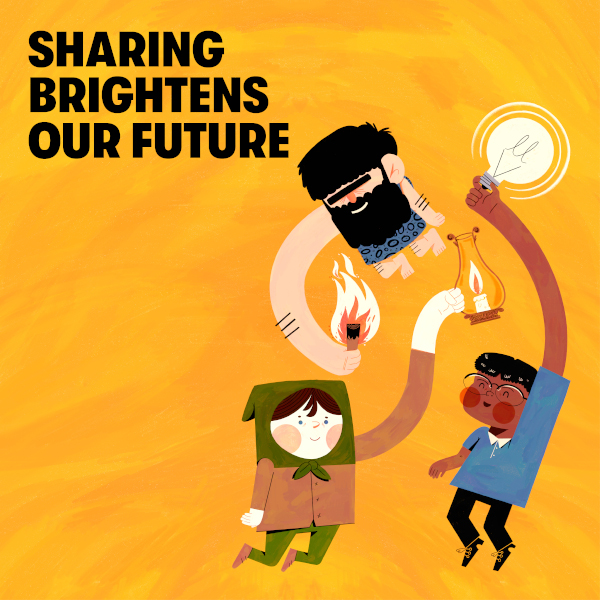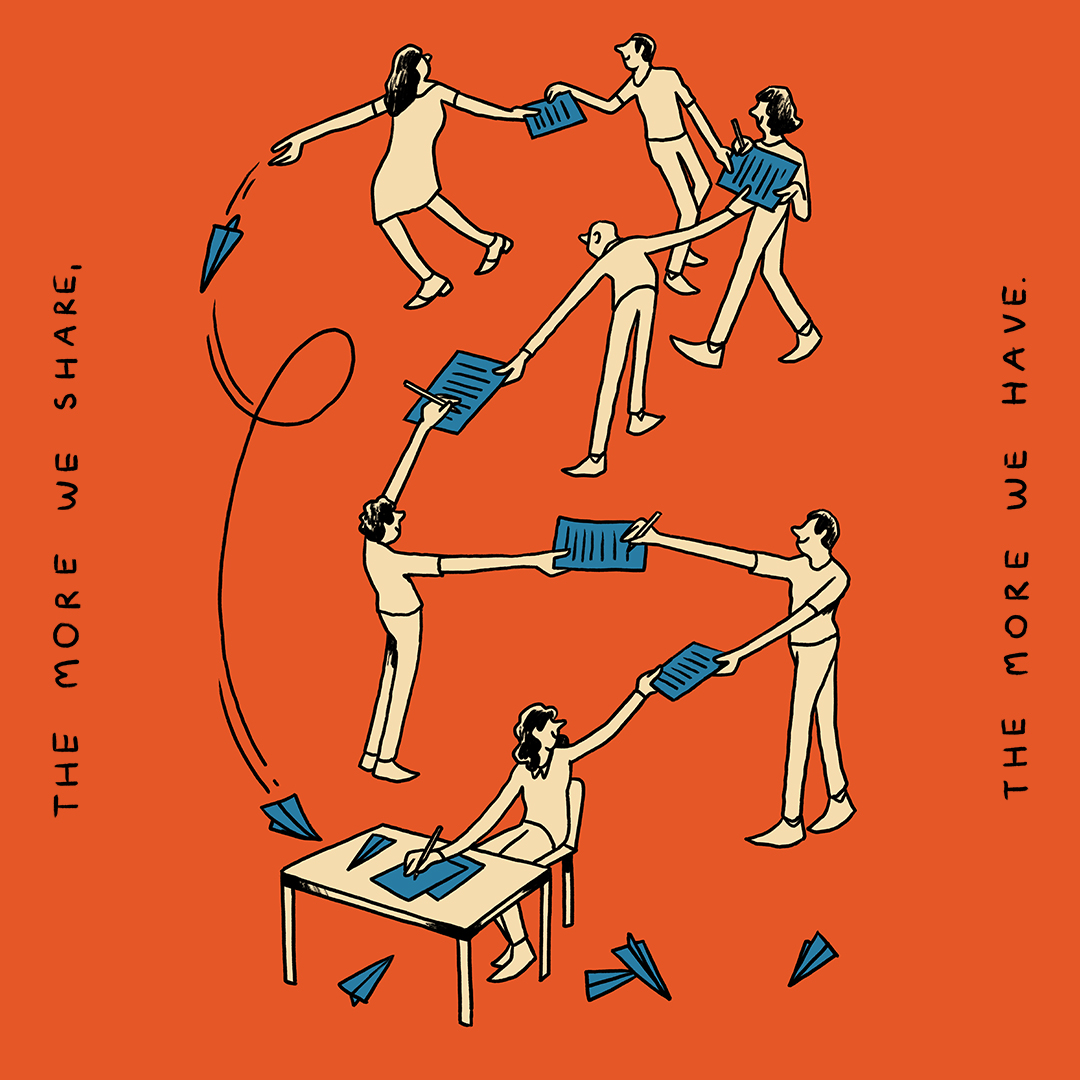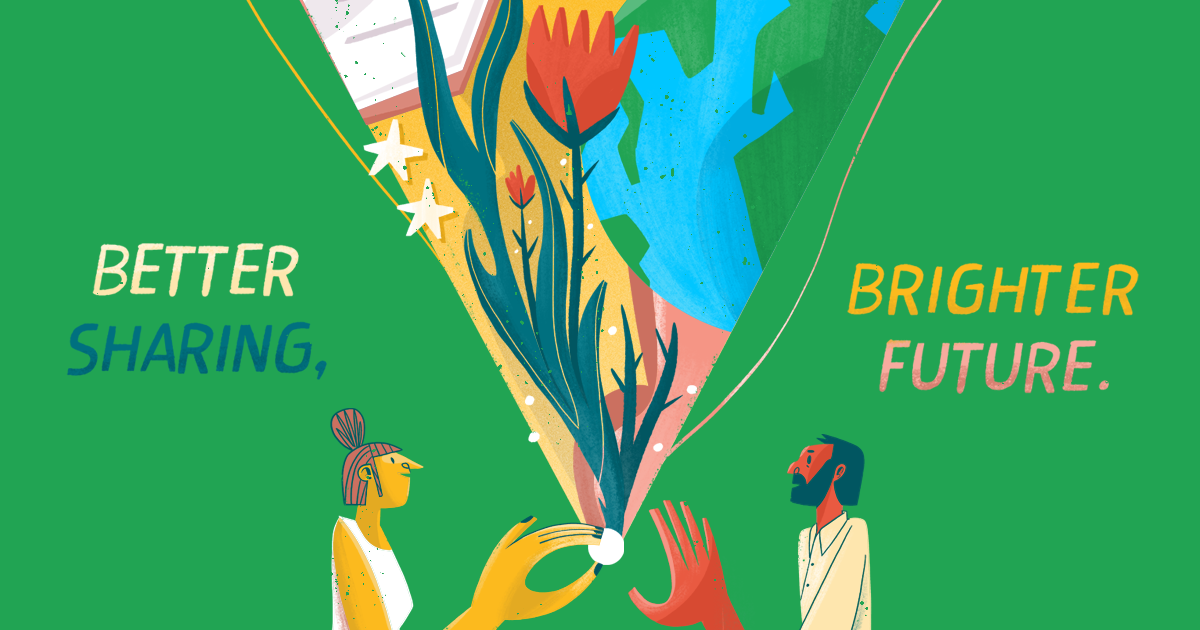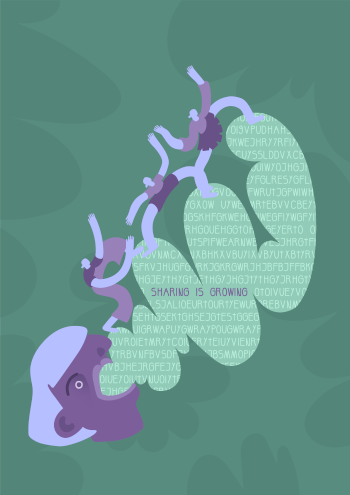The Free Knowledge Institute: Two Decades of Digital Commons Innovation

Above image is titled “Sharing Brightens The Future” by Bulgarian illustrator and graphic designer, Teo Georgiev. The piece is part of The Greats, licensed under CC BY-SA 4.0, was inspired by a quote from Biyanto Rebin, an open knowledge advocate and Indonesian Wikipedian:
“Sedikit demi sedikit, lama-lama menjadi bukit (meaning: many a mickle makes a muckle).”
The Free Knowledge Institute: Two Decades of Digital Commons Innovation
The Free Knowledge Institute (FKI) has worked within the digital commons movement for nearly two decades, focusing on open knowledge, collaborative technologies, and sustainable cooperative models. From its origins in the Netherlands to its work in Barcelona’s commons ecosystem, the organisation has explored how academic research can translate into practical tools for building more equitable digital futures.
Foundation and Early Years (2006-2011)
 The FKI’s journey began in 2006 when its team coordinated the European Commission-funded SELF project, creating a platform of free knowledge educational resources about free and open source software. This initial project established the organisation’s focus on democratising access to knowledge and technology.
The FKI’s journey began in 2006 when its team coordinated the European Commission-funded SELF project, creating a platform of free knowledge educational resources about free and open source software. This initial project established the organisation’s focus on democratising access to knowledge and technology.
In 2007, the FKI was formally established as a foundation in Amsterdam, spinning off from the Internet Society Netherlands. This institutional foundation provided the platform for the organisation’s ambitious educational initiatives. The following year marked a significant milestone when FKI co-organised the international Free Knowledge Free Technology Conference in Barcelona, establishing early connections with the Catalan capital that would later become central to its work.
The organisation’s educational work became evident in 2008 when it secured European Commission funding to establish the Free Technology Academy (FTA). This initiative offered master-level courses on free software and open standards through a consortium of European open universities, operating under Europe’s Erasmus Programme. The FTA represented an approach to higher education that applied open knowledge principles to formal academic structures.
FKI’s collaborative approach continued to flourish through partnerships with various organisations. In 2009, it co-organised Xnet’s Free Culture Forum in Barcelona, further strengthening its ties with the Spanish open culture movement. Between 2009 and 2011, the organisation participated in the openSE project, working on open educational content frameworks that would influence later developments in commons-based education.
Growing Influence and Recognition (2010-2015)
The early 2010s saw FKI gaining recognition within the international commons community. The organisation participated in events including the Drumbeat festival in Barcelona, the fOSSA congress in Grenobles, and the International Commons Conference in Berlin in 2010. These participations connected FKI with the growing global conversation about commons-based alternatives to traditional economic models.
Following the conclusion of European Commission funding in 2011, the FTA consortium continued operations based on student fees, demonstrating the sustainability potential of commons-based educational models. This transition period proved crucial for FKI’s understanding of how commons initiatives could achieve long-term viability.
In 2013, FKI’s participation in the Economy of the Commons Conference in Berlin marked a deepening engagement with economic theory and practice around commons-based models. This involvement would later inform the organisation’s most significant contribution to the field: the development of the Five Pillar Framework.
The Barcelona Chapter and Innovation (2015-2018)
 The period from 2015 to 2018 represents perhaps the most transformative phase in FKI’s history. The organisation’s participation in the Digital DIY research project, funded by the European Commission’s Human Digital Age programme, provided the foundation for developing practical tools that would have lasting impact on the commons movement.
The period from 2015 to 2018 represents perhaps the most transformative phase in FKI’s history. The organisation’s participation in the Digital DIY research project, funded by the European Commission’s Human Digital Age programme, provided the foundation for developing practical tools that would have lasting impact on the commons movement.
In 2016, FKI published the first version of its Five Pillar Framework for cooperative commons sustainability models. This framework, developed as part of the Digital DIY research project, represented a contribution to understanding how commons-based organisations could achieve sustainability whilst maintaining their core values.
The same year brought several institutional developments that would define FKI’s Barcelona-based activities. The organisation became the legal umbrella for The Things Network Catalonia (TTNcat), a community Internet of Things network that embodied many of the principles FKI advocated. More significantly, FKI signed a Memorandum of Understanding with Barcelona City Council to establish “BarCola” – the Barcelona Commons Collaborative Economy Commission. This partnership brought together research institutions and grassroots community organisations to articulate alternatives to extractive collaborative economy models.
FKI’s practical application of its theoretical work became evident when Barcelona Activa selected the organisation to realise the first edition of ,a target=_blank href=”https://www.barcelonactiva.cat/en/-/actualitat/la-comunificadora-busca-nous-projectes-deconomia-collaborativa-per-impulsar-los”>La Comunificadora</a>, a support programme for commons collaborative economy initiatives. Shaped around the Five Pillar model and supported by a diverse ecosystem of mentors, this programme accompanied a first cohort of projects through the transition to commons-based business models.
Cooperative Evolution and Legacy (2017-2025)
 The year 2017 marked a significant transition in FKI’s organisational approach. The organisation convened a dozen organisations to initiate CommonsCloud, a cooperative cloud initiative that exemplified the practical application of commons principles to digital infrastructure. More importantly, FKI co-founded femProcomuns SCCL, a multistakeholder cooperative in Barcelona that would become the vehicle for continuing and expanding much of FKI’s work.
The year 2017 marked a significant transition in FKI’s organisational approach. The organisation convened a dozen organisations to initiate CommonsCloud, a cooperative cloud initiative that exemplified the practical application of commons principles to digital infrastructure. More importantly, FKI co-founded femProcomuns SCCL, a multistakeholder cooperative in Barcelona that would become the vehicle for continuing and expanding much of FKI’s work.
This transition reflected FKI’s commitment to practising what it preached. By transferring CommonsCloud, its transition programme work with La Comunificadora, and the community IoT network around The Things Network Catalonia to the cooperative, FKI demonstrated how organisations could evolve toward more participatory and sustainable models.
In 2018, FKI took a step back from direct project implementation, focusing instead on supporting femProcomuns in establishing its activities. This period of consolidation included international networking activities, such as participation in London’s OpenCoop Conference, which helped connect FKI’s experiences with broader international movements.
The organisation’s continued commitment to cooperative models became evident in 2020 with its role in co-founding The Online Meeting Cooperative (meet.coop), demonstrating how commons principles could be applied to digital collaboration tools that became essential during the global pandemic.
Current Revival and Future Ambitions
After a period of reduced activity, 2025 has seen FKI reactivate with renewed ambition. The organisation now aims to accelerate the growth of digital commons across multiple domains, including cooperative clouds, community networks, platform cooperatives, data commons, community AI, and civic technology. This revival reflects both the growing relevance of commons-based approaches and the accumulated experience FKI has gained through nearly two decades of practice.
The Five Pillar Framework, originally developed by FKI in 2016, continues to evolve and find new applications. Through its partnership with femProcomuns and ongoing refinement by practitioners, the framework has become a recognised methodology for developing sustainable, community-driven business models that prioritise shared value over extractive practices.
Impact and Recognition
FKI’s contributions have gained recognition in various media and academic contexts. The organisation’s work has been featured in publications such as La Vanguardia and academic publications including the 2019 Sharing Cities Action book, which published a chapter about the Five Pillar Sustainability Model of the Commons.
FKI’s work with Barcelona City Council helped establish frameworks for supporting commons-based alternatives to extractive collaborative economy models, whilst its educational initiatives trained practitioners and researchers across Europe in open knowledge and technology approaches.
The Free Knowledge Institute’s nearly two-decade journey illustrates how sustained commitment to commons principles can contribute to institutional change. From its early work in open education to its current focus on diverse digital commons initiatives, FKI has worked to demonstrate that alternatives to extractive digital capitalism are possible and practical. As the organisation enters its third decade, its experience and developed methodologies position it to contribute to scaling commons-based approaches to meet the challenges of an increasingly digital world.